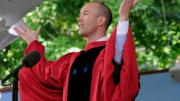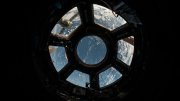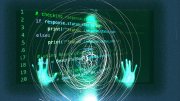In addition to giving the graduate English address, Jonathan Service received a Ph.D. in Japanese history today. In his speech, he looked to the Japanese poet Basho for wisdom.
Yuku haru ya
Tori naki
Uo no me ha namida
This was the poem Basho wrote for the occasion of his departure from his home near Edo, the metropolis that would become Tokyo, as he sought "to leave behind the cosmopolitan comforts of the city in order to discover the wilds of the north. The text translates: "It is the spring of leaving; the birds are crying, and in the eyes of the fish, there are tears."
Charming as this image may be, Service suggested that "the ascription of human emotion to the world around us, while it raises us up to abstract heights, tends to obscure the intimate, the concrete, the here and now of the people around us." He asked his readers to assume that the birds are not "crying" but merely singing as they always do, and that the fish have wet eyes simply because they live in the water. "With this second reading in mind," he said, "...make time today to look each member of your family in the eyes and tell them how much you appreciated their love and support...to thank your teachers and mentors for opening fresh vistas before you."
Then, Service instructed his listeners to return to the first interpretation of Basho's poem: "Allow yourself to perceive all of nature conspiring to celebrate your achievement... Every bee buzzing the news, every lily whispering of the changes you will make, every ant lining up in salute...the very walls of the University pulling themselves up to their full height as they think of what you will do in the world out there."









